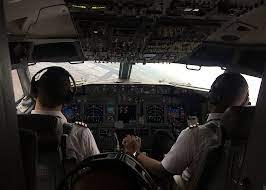Last Updated on March 9, 2024 by Saira Farman
Getting the chance to become a pilot is a goal shared by aviation enthusiasts. The journey from being an aspiring aviator to obtaining a commercial pilot status can be quite demanding. However, anyone can aim for the sky with the right mindset, dedication, and preparation.
So, in this blog post, we will explore some tips that can assist individuals in their pursuit of becoming aviators and getting their commercial pilot’s license.
Table of Contents
I. Building a Strong Foundation in Aviation Education
Before embarking on the path to becoming a pilot, it is vital to establish a base in aviation education. Acquiring a Private Pilot License (PPL) should be your objective. This license enables you to fly aircraft for purposes and acts as a stepping stone towards more advanced certifications.
Enrolling in a flight school or aviation academy will provide you with the theoretical knowledge and practical training required. Look for programs that have experienced flight instructors and offer courses tailored toward achieving your desired licenses.
II. Meeting the Minimum Flight Hour Requirements
To become a commercial pilot, one must accumulate a number of flight hours as stipulated by regulatory authorities such as the Federal Aviation Administration (FAA). Although this requirement might initially appear overwhelming, there are ways to log valuable flying hours;
1. Instructor Role: Consider exploring the idea of becoming a flight instructor yourself. It not only allows you to gain experience and enhance your skills but also gives you the opportunity to find fulfillment in teaching others.
2. Time Building Opportunities: Look for employment or volunteer positions that offer flight time accumulation while serving in roles like skydiving operations or aerial survey missions.
III. Networking and Job Prospects
Networking within the aviation community is essential for securing job opportunities as a pilot. Engage with pilots at industry events, actively participate in forums dedicated to aviation enthusiasts, and join professional organizations that align with your interests.
Internships or co-op positions at airlines, aviation maintenance companies, or airport administrations can provide exposure to the industry and potentially open doors for future career prospects.
IV. Developing Key Soft Skills
In addition to competence, successful commercial pilots possess soft skills that enable effective collaboration with crew members, passengers, and operators.
1. Communication: Some crucial soft skills for pilots include concise communication in the cockpit with both crew members and air traffic controllers. Being a listener and expressing instructions effectively can prevent misunderstandings and ensure safety during flights.
2. Leadership: Being a pilot necessitates the ability to make decisions and take charge in emergency situations. Displaying leadership qualities will instill confidence in your pilot skills.
3. Teamwork: Commercial aviation typically involves collaboration with team members such as fellow pilots, cabin crew, dispatchers, engineers, and more. Working together ensures smooth flight operations.
V. Pursuing Advanced Certifications
While holding a Commercial Pilot License (CPL) is crucial for a career as a scheduled flight pilot, acquiring certifications significantly enhances your profile. Instrument Rating (IR) allows pilots to fly under Instrument Flight Rules (IFR), enabling navigation regardless of cues—a skill when facing challenging weather conditions. Multi-engine Rating enables piloting aircraft with engines — a qualification when pursuing opportunities with major airlines or cargo operations.
VI. Continuous Learning & Staying Up-to-Date with Industry Trends
Aviation is an evolving field influenced by advancements and regulatory updates. Keeping up with these changes through learning is essential for growth as a commercial pilot. Subscribe to aviation magazines/journals covering topics ranging from safety guidelines to cutting-edge aircraft technologies. Participate in training sessions organized by airlines, like simulator training, to stay updated on the latest industry practices.
Conclusion
Becoming a pilot requires dedication, perseverance, and a commitment to learning. Aspiring aviators can pave their way toward a successful career as commercial pilots by focusing on building a foundation in aviation education, gaining flight experience, developing important interpersonal skills, networking within the aviation community, pursuing advanced certifications, and staying current with industry trends. Remember that this journey may present challenges. It is also incredibly rewarding. So don’t be afraid to spread your wings and soar towards your dreams!



























